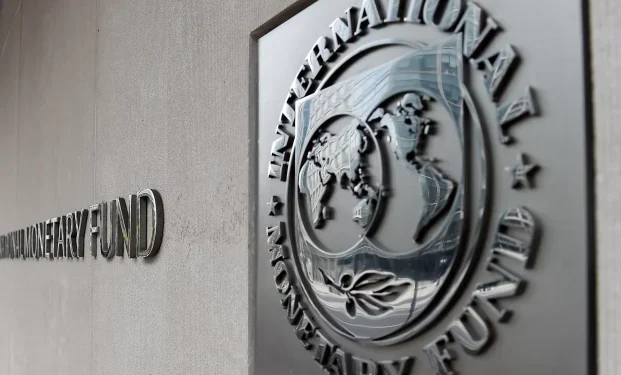Growth of Nonbanks Revealing New Financial Stability Risks, IMF Says
Stretched asset valuations and pressures in core sovereign bond markets are keeping financial stability risks elevated amid heightened economic uncertainty. These vulnerabilities could be amplified by the growth of nonbank financial institutions—through their growing importance as market makers, liquidity providers and intermediaries in private credit, real estate, and crypto markets.
As we detail in our new Global Financial Stability Report, stress testing shows that the vulnerabilities of these nonbank intermediaries can quickly transmit to the core banking system, amplifying shocks, and complicating crisis management.
To be clear, policymakers have had nonbanks on their radar for some time. They include insurance companies, pension funds, and investment funds; and while they do not take deposits, they play an increasingly large role in global markets. Regulatory treatment also varies considerably, with dedicated supervisory frameworks for insurance companies and less comprehensive prudential oversight for many others.
While nonbanks can help facilitate capital market activities and channel credit to borrowers, their expansion also increases risk-taking and interconnectedness in the financial system. Together, nonbanks now hold around half of the world’s financial assets. In the United States and the euro area, many banks now have nonbank exposures that exceed their Tier 1 capital—a crucial cushion that allows a bank to absorb losses and remain stable in times of crisis. Similarly, nonbanks now account for half of daily foreign exchange market turnover, more than double their share of 25 years earlier, as we show in an analytical chapter of the GFSR.
This shift in financial intermediation calls for a more comprehensive, forward-looking approach to risk assessment. Unlike banks, nonbanks, for the most part, operate under lighter prudential regulation. In addition, many provide limited disclosure of their assets, leverage, and liquidity—making vulnerabilities and interconnections harder to detect.
Some regulators, including those in the United Kingdom and Australia, have begun integrating system-wide stress tests and scenario analysis to better understand interactions between banks and nonbanks. These efforts have revealed the need for better data, stronger domestic and cross-border coordination, and regulatory innovation to keep pace.
Nonbanks can transmit risks to the financial system through many channels, including private credit, real estate, and crypto assets, as mentioned above—all requiring policymaker attention. One channel we study in the new GFSR is the impact on banks. For several years, the IMF has applied its Global Stress Test, or GST, to assess banking sector resilience. This time, our test models a stagflationary shock—combining a recession, higher inflation, and rising yields on government debt. The stress test finds that banks holding about 18 percent of global assets would see their Common Equity Tier 1 ratios fall below 7 percent. Although the results mark an improvement from earlier assessments, these tests reveal a subset of weaker banks within the system.
To capture the growing interlinkages between banks and nonbanks, we introduced a new layer of analysis to our stress testing, focused on spillover risks. The results are striking: adverse developments in nonbanks—such as downgrades by credit rating agencies or falling collateral values—could significantly affect banks’ capital and liquidity ratios.
In a stress scenario in which nonbanks become riskier and fully draw their credit lines from banks, about 10 percent of US banks and 30 percent of European banks (by assets) would see their regulatory capital ratios fall by more than 100 basis points. In other words, bank losses and capital declines increase sharply alongside stress among nonbanks, demonstrating that vulnerabilities in the nonbank sector are interconnected—they can quickly transmit to the core banking system, amplifying shocks and complicating crisis management.
Another channel through which nonbanks can amplify stress in the financial system is through core bond markets—high-quality, investment-grade fixed-income securities that serve as benchmarks for the broader market. One way this can occur is via liquidity mismatches in open-ended investment funds, which arise when investors can sell shares quickly but the assets needed to meet redemptions take more time to sell. When market volatility spikes, investor redemptions and margin calls can force these funds to sell their most liquid assets.
The GFSR’s analysis of US mutual funds shows that, assuming outflow patterns similar to March 2020 and an 80-basis-point increase in interest rates, forced bond sales could reach nearly $200 billion—three-quarters of which would be Treasury securities. In extreme cases, sales could overwhelm dealer intermediation capacity, disrupt market functioning, and spill over into funding markets. These results underscore the importance of ensuring that mutual funds have adequate liquidity management tools to help reduce the risk of forced sales.
Greater nonbank involvement in sovereign bond markets does have positive effects, as we show in another analytical chapter of the GFSR. Emerging market economies with stronger fundamentals have increased their local-currency borrowings from domestic nonbanks, such as pension funds and insurance companies. The rising share of bonds held by nonbanks in emerging economies has coincided with improved liquidity when bond markets face global shocks and has likely reduced government reliance on bank borrowing.
But it’s also important to distinguish between domestic and foreign nonbanks. Foreign institutions remain key investors in emerging market assets. These investments could be withdrawn when markets become turbulent, tightening emerging market financial conditions. That means the cross-border impact of nonbanks needs to be better understood.
Policy priorities
Financial stability ultimately depends on sound policies and resilient institutions. Prudent fiscal and monetary policies, limits on external imbalances—such as current account deficits and external debt, and effective lender-of-last-resort and emergency liquidity assistance remain essential. At the same time, amid the growing prominence of nonbanks, policymakers must reinforce the resilience of the core of the financial system.
Our GST’s finding—that many banks remain vulnerable—underscores the need to further strengthen capital and liquidity by implementing internationally agreed standards, notably Basel III. Safeguarding the banking sector against contagion from weak banks can be achieved by advancing recovery and resolution frameworks and enhancing central banks’ emergency liquidity assistance.
The growing importance of nonbanks, and their links with banks, also calls for enhanced supervision. This means collecting more comprehensive data, improving forward-looking analysis—such as system-wide liquidity examinations—and strengthening coordination among sector supervisors.
Private credit certainly warrants closer attention. Nonbank lenders, especially private credit funds, have grown rapidly in recent years, adding to financial stability risks because they are less transparent and not as firmly regulated. Finally, to address liquidity pressures and forced bond sales by nonbanks, it is essential to improve and expand the availability and usability of liquidity management tools for open-ended investment funds.








